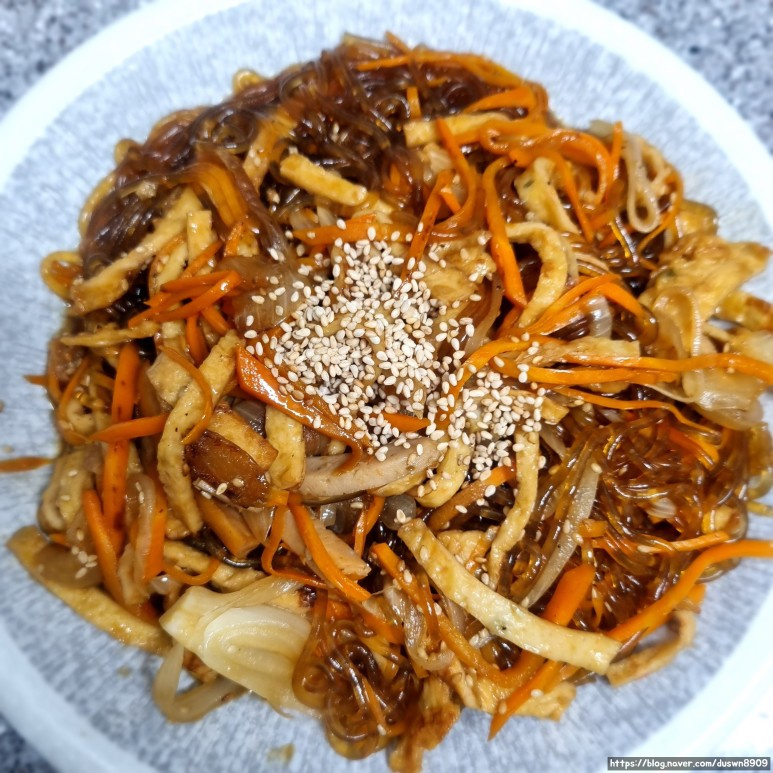Quick Stir-Fried Japchae
Enjoy Delicious Stir-Fried Japchae by Quickly Sautéing Ingredients!

Japchae often requires a lot of effort. Now, instead of the usual tedious process of boiling and mixing, enjoy a delightful stir-fried japchae made right in your pan! You can make it deliciously even with leftover vegetables from your fridge.
Main Ingredients- 1 handful Glass Noodles (approx. 100g)
- 1/2 Carrot
- 2 sheets Fish Cakes (rectangular type)
- 1/2 Onion
- A little Spam or Luncheon Meat
Cooking Instructions
Step 1
Before you begin cooking, prepare the glass noodles by soaking them until softened. You can soak them in lukewarm water for over 30 minutes according to package directions, or boil them in hot water for about 5-7 minutes and then rinse under cold water. (Tip: Drain the soaked noodles well in a colander.)

Step 2
Prepare the vegetables, fish cakes, and ham that will enhance the flavor of your japchae. Wash and peel the carrot and onion, then slice them into fine julienne strips about 0.5cm thick. Similarly, slice the fish cakes and ham into strips of similar thickness and length for even cooking and appealing presentation.

Step 3
The foundation of stir-frying! Heat a pan over medium heat and add 1 tablespoon of cooking oil. Swirl the pan to coat the surface with oil, which helps prevent ingredients from sticking and ensures even cooking.

Step 4
Start by adding the carrots to the pan and stir-fry them. Carrots take a bit longer to cook, so stir-frying them first helps to equalize the cooking time with other vegetables. Sauté for 1-2 minutes until the carrots are slightly tender.

Step 5
Once the carrots are somewhat cooked, add the sliced onion and continue to stir-fry. Sautéing the onion until it becomes translucent will bring out its sweetness, enhancing the overall flavor of the japchae. Cook for about 1 minute.

Step 6
As the onion starts to turn transparent, add the julienned fish cakes and stir-fry. Fish cakes cook quickly, so stir-frying them with the vegetables will make them tender and allow the flavors to meld. Sauté for about 1 minute.

Step 7
Finally, add the julienned ham and gently stir-fry, making sure the ingredients don’t clump together. Since ham is usually pre-cooked, sauté for only about 30 seconds to 1 minute, just until the colors blend evenly with the other ingredients.

Step 8
At this stage, it’s a good idea to remove the sautéed vegetables, fish cakes, and ham to a separate bowl. Stir-frying the ingredients separately like this prevents the glass noodles from burning when you cook them and ensures they absorb the seasoning evenly. You can later stir-fry them again with the noodles or mix them in a sauce.

Step 9
Now it’s time to cook the glass noodles. Drain the soaked noodles and add 300ml of water and 3 tablespoons of soy sauce to the empty pan. Stir well to prevent the soy sauce from sticking to the bottom.

Step 10
Add 2 tablespoons of corn syrup (or oligodang) for sweetness. Adding corn syrup helps to achieve the signature glossy finish and sweet taste of japchae. Mix well.

Step 11
Add 1 tablespoon of mirin or cooking wine to enhance the flavor of the japchae. The alcohol will evaporate, leaving behind a savory taste that eliminates any gamey odor from the ingredients.

Step 12
Finally, add another tablespoon of cooking oil for flavor and mix all the seasonings thoroughly. Once the sauce starts to simmer, taste it and adjust the sweetness and saltiness with more soy sauce or corn syrup as needed to achieve your desired balance. This level of seasoning is ‘OK’!

Step 13
Add the prepared glass noodles to the simmering sauce and stir them well with chopsticks or tongs, ensuring the sauce coats the noodles evenly. It’s important to loosen the noodles so they don’t clump together.

Step 14
As the glass noodles absorb the sauce and start to turn translucent, add all the previously sautéed ingredients (carrots, onion, fish cakes, ham) back into the pan. Stir everything together again for 1-2 minutes until well combined.

Step 15
Once all ingredients are well combined and the noodles are tender, turn off the heat. Lastly, drizzle with sesame oil for a fragrant finish. The aroma of sesame oil will whet your appetite.

Step 16
This is the finishing touch! Sprinkle a pinch of black pepper and a generous amount of sesame seeds for a visually appealing and even more flavorful stir-fried japchae.

Step 17
Your moist and chewy stir-fried japchae is ready! It tastes best when served immediately while warm. This dish is perfect as a side dish for rice or even as an impressive dish for guests.



